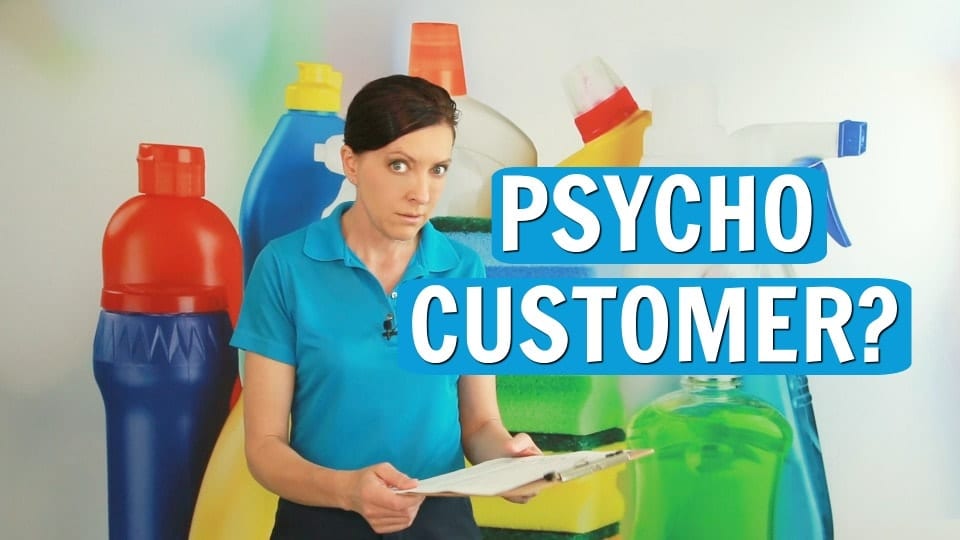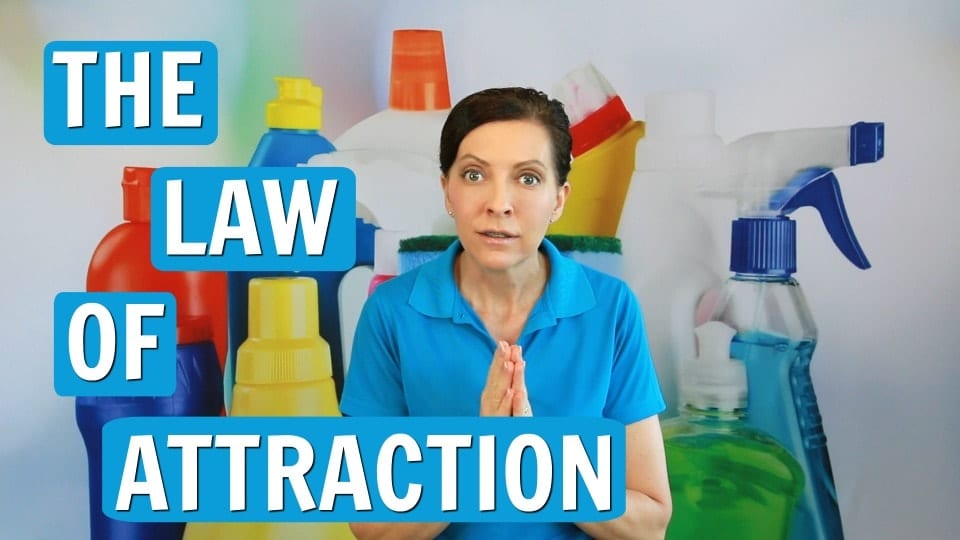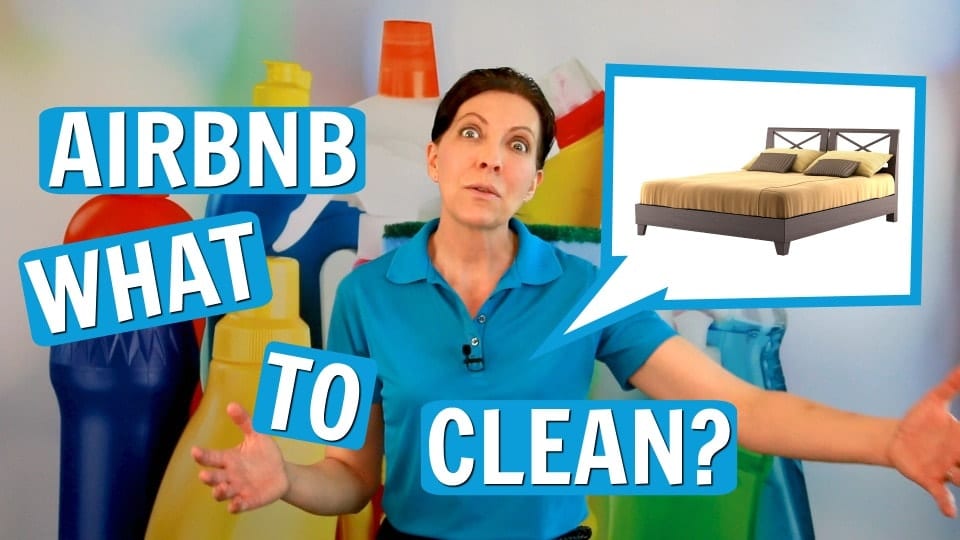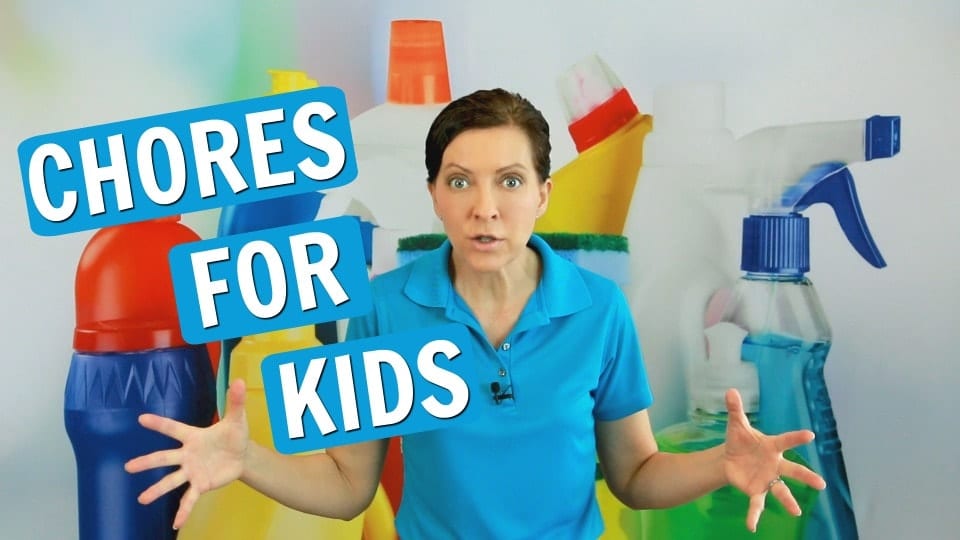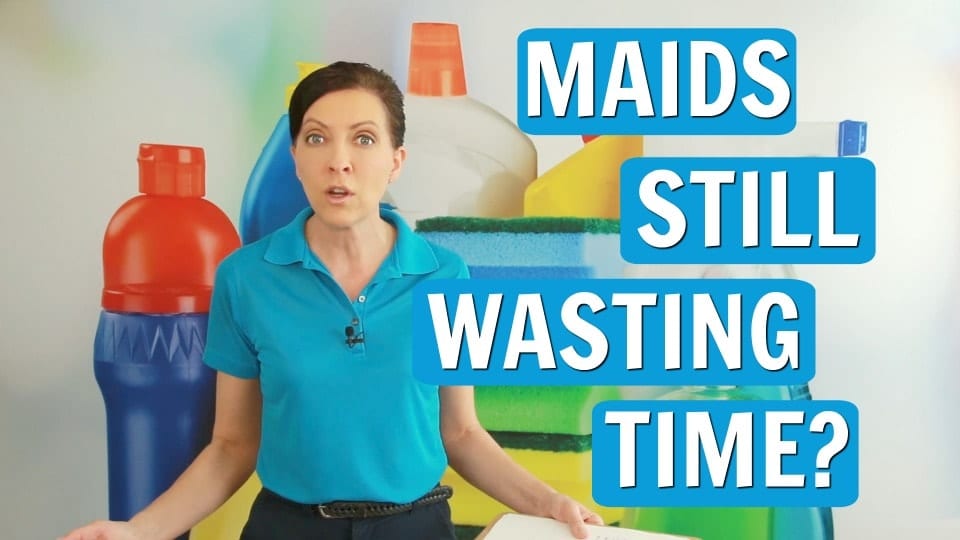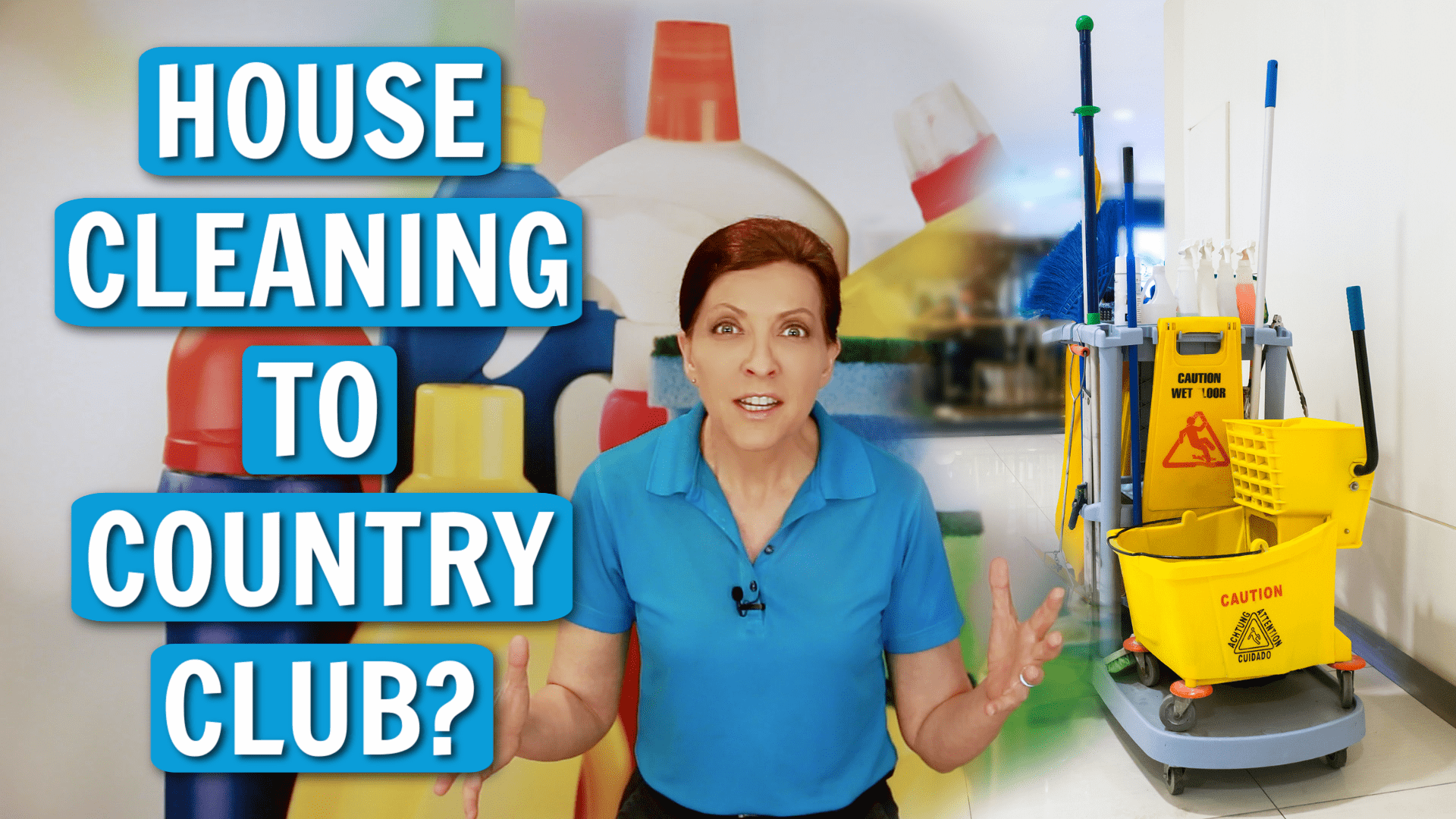Problematic customer or psychopath? These mad, nutcase, house cleaning clients will make you wonder.
A problematic customer is among the three types of customers a maid service will work for. The other two are difficult customers and high maintenance customers. But hands down, the problematic customer is the worst.
Angela Brown, The House Cleaning Guru breaks it down in this maid service training. They give you impossible deadlines, micromanage your work, complain, and sometimes sue contractors.
We Ask a House Cleaner about the insanity and havoc they wreak for house cleaners and maids. And what you should say when you quit.
Today’s show sponsor is https://HouseCleaning360.com HouseCleaning360 is a business referral network for house cleaners and maids and housekeepers.
Listen: Problematic Customer or Psychopath?

Watch: Problematic Customer or Psychopath?
Hey there, I’m Angela Brown, and this is Ask a House Cleaner. This is a show where you get to ask a house cleaning question, and I get to help you find an answer.

Question: Problematic Customer or Psychopath?
Yikes! There’s more? More signs to recognize a problematic customer and ways to cope?

Answer: Problematic Customer or Psychopath?
Three Types of Customers (Part 1)
Problematic Customers (Part 2)

A Problematic Customer Will Leave New “To Do” Lists for You
And they expect to pay nothing extra for these chores. This is superiority. “I am important and get to make special requests because you’re just the hired help. Not my problem if you have another job after this one. I come first.”
You did your walk-through. Here’s my cleaning list. Here’s what we agreed to. And you give them an agreement or a contract. That is what you have agreed to.
Now you show up to clean and they have a new to-do list for you. Hey, we didn’t use our dining room this week, so we took $10 off your pay. Or we didn’t use the dining room this week, so can we have you do this instead?
Okay, you’re the business owner. You get to decide.
But my rule of thumb is, no, that’s not what we agreed on. So if you have something else you’d like me to do, I would be happy to give you a price for more projects.
Because what happens is this. If you say yes, you’re training the customer to provide you with new to-do lists every single time. These things may take longer than the time you’ve allotted. That makes you late for your next customer’s house.
So because you work on a schedule and you have deadlines. And you have to meet the expectations of all your customers.
You say, “Wow. These are new tasks. They’re not on our agreement. So if you would like, I could give you a price for those extra tasks. And I would be happy to add those to my calendar next time. This way I can give myself plenty of time to give those tasks the attention they deserve.”
How about that? That will discourage them from creating to-do lists every time.

A Problematic Customer Will Have Impossible Deadlines for You to Complete the Cleaning
This may be a house cleaning emergency that is not on your schedule. Suppose they are hosting a company party tomorrow and can you come today to get the house ready? – This is manipulation through guilt. “If you’re as good as you think you are; you’ll make it happen. Or, you’re the boss, don’t you have control over your own schedule?”
We also call this emergency cleaning, right? They’ll call you and say, “Oh my gosh. My mom is coming to town tomorrow. Can you come over and get all the guest rooms ready and come over and help me with my house?”
Uh, no. This is not your regular day for cleaning. You knew in advance that your mother was coming in. She had to buy an airline ticket. So when she bought her airline ticket, she most likely called you and asked if she could come for a visit.
During that time, I’ve already been to your house. So you knew she was coming. You could have told me three days ago when I was there that your mother was coming at the end of the week. And we could have gotten the guest room ready at that time.
Now, there are emergencies. Like, maybe the house has flooded or a tree has fallen over and it will have knocked some debris into the house. There are legitimate reasons for an emergency cleaning.
For the real and valid emergencies from excellent customers, you just jump through hoops.
You say, “Listen. I don’t get off work until five o’clock tonight, but I will be there at 5:30. I will work until we fix your problem.”
But if this is one of those problematic, psychopathic customers, no. We do not do emergency cleanings and especially not because you just forgot to tell me your mom was coming.

A Problematic Customer Will Complain About Your Work.
This is belittling and intended to intimidate. It’s also a control freak move. They want you to re-do all your work because “It’s just not good enough.”
I love this. So, you do an excellent job. You come recommended. You know you’re the best in town. You’re doing an amazing job because you’ve worked off referral for 20 some years.
And then they complain about your work. Like, well, this, that, and the other. Okay. What exactly are you pointing at?
Then ask them, “What would you like to see happen next?”
They may say, “Well, re-clean it.”
Okay. Great. “Would you mind watching me re-clean this, so that I can meet your standard of excellence?”
Get them involved in the practice.
“Now would you like to point out where else I may have skipped?”
Because guess what, once a countertop is clean, it’s clean. Once the crumbs are gone, the crumbs are gone. You can show them with a flashlight.
“Are we in agreement that everything here meets the expectation? Okay, awesome.”
If you come back and get them involved, they will have to postpone their plans. Their time is now consumed by their behavior. So if they complain about your work, wow, you have huge problems.

 A Problematic Customer Will Complain About Their Work, Family, Life, Health Etc.
A Problematic Customer Will Complain About Their Work, Family, Life, Health Etc.
This is emotional manipulation, intended for you to feel bad for them. Give them something for nothing, and then throw in something extra, something special.
Now, I don’t know why but people who are in control love to tell you all their problems. Like you’re their free therapist. They’ll tell you, “Oh, my hip. I just had to have hip surgery. And my knee, I had to have knee surgery. And my head. I had to have a head surgery. And then I had to have my shoulder replaced.”
And they’ve got all these ailments and these wicked problems and complaints. Or it might be their kids, their family, or whatever. And they just spew all these complaints that are completely exhausting to listen to.
And so you can tell that you are dealing with a problematic customer when they start spewing all this stuff.
Guess what? I have problems too. How about that? But because I’m a professional, I’m not going to share those with my customers.
So you get to the customer’s house and they start spewing all this stuff at you, let it be one-sided. Do not engage.
“Oh, my hip, my aching back.” Just go, “Hmm. That’s something.”
Neutral comments. Don’t go, “Oh my gosh, are you okay?”
That eggs them on. You don’t want the conversation to continue. Because you don’t want them to chat while you’re working. You don’t want to encourage this conversation.
So simple, one-word answers. Like, “Oh. Hmm. Interesting.” It’s neutral. It says, “I heard you. I don’t have an opinion. I’m not going to comment. I’m not going to engage and I’m not going to continue this drama.”

A Problematic Customer Will Have a past History of Suing Past Contractors and Vendors
This is a control method through threats. “Give me what I want, ![]() or I’ll sue you, and your company – and then you’ll lose your job.”
or I’ll sue you, and your company – and then you’ll lose your job.”
For whatever reason, they will sue you or accuse you of theft. They will take you to small claims court, they will try to sue you for something else, they will try to bash your reputation online. They will do whatever they can do to destroy you.
And they will let you know that upfront. “I have destroyed the characters and businesses of so many people. I have assassinated characters of people.” And they brag and boast about this stuff.
Guess what? That is a problematic customer that we don’t need for our business.
So if you have problematic customers that are creating chaos in your business. I am giving you permission to recognize these based on these red flags and turn and walk away.
You can do it in a professional, friendly way.
And just say, “Hey, listen. It’s been a real education working for you. And during this time that we’ve been working together, I have discovered we are not a good fit for each other.”
And be bold and blunt when you say these words.
Just don’t say, “Oh, my schedule got busy and I’m not going to be able to come back.”
Don’t say that. Be bold and say, “We’re not a good fit for each other. I hope you find somebody that is a good fit for you.”
And if they say, “Can you tell me what I did?” Be honest with them.
This is a person who has been bold and forward with you. Be bold and honest with them.
And say, “Man, lady, you are the highest maintenance person I’ve ever worked for. While I think you’re an amazing person, as far as working with you, you’re impossible. And I’m not going to be able to work with you and neither is anyone on my team. I’ve made a note here that our companies will never be able to work together again. Again, it’s not personal. You’re a lovely neighbor. When I see you in the neighborhood, I’ll say hi when I’m out walking my dog or whatever. But for business, let’s not do this again. Just let’s not.”
Give them a heads up. Because some people don’t know that they’re problematic. Some people don’t know that.
Some people are not mature enough to have that conversation. And by all the spewing and telling of all their problems and all that stuff, you’ll be able to pick up on that.
If it’s a person that cannot handle that conversation, don’t have that conversation. Just say, “We’re not a good fit.” And leave it at that.
Because that’s often, and 9 times out of 10, that’s going to be your best answer. We’re just not a good fit for each other, okay? But thank you. Thank you for your business. See you later. And then leave.

Offer Excellent Customer Service
Do you have rules for your customer service? Do you offer a 100% money back guarantee? Is it a no questions asked policy?
You know customer service is what differentiates you from your rivals. If you want to survive in business today you need to provide excellent customer service. Period.
We live in a social media society, this means people will rave, rate, review and refer you to their friends. You hope people talk about you. It’s cool for people to post pictures of their homes you’ve cleaned on Facebook and Pinterest. You want people to love you and the work you do. And you want their friends to hire you.
So from here on out, for all types of customers – get rid of the no questions asked policy. If someone wants a refund, you need to know why. How are you expected to fix what went wrong if you don’t know why?
Customer Service for Difficult Customers
When you are dealing with a difficult customer – you have to be patient and kind. Most of the time they don’t know how to communicate. They are afraid of confrontation and they need your understanding. Be gentle. Empathize. Make concessions. You’re not great at reading minds so make it safe for them to express what they need. It’s okay to question their client satisfaction. Then fight like heck to correct the situation and keep their business.
Customer Service for High Maintenance Customers
The high maintenance customer expects a lot. A lot of attention, a lot of quality, a lot of savings, a lot of services.
You’re going to have to set boundaries up front with a high maintenance customer. Let them know how far they can push you. Set realistic expectations. Agree to terms of what “a lot” means.
You may need to text them before you arrive. Do they need you to text them with photos of the home when you finish cleaning? Do they need to know six months in advance that you’re raising your prices? High maintenance customers, for the most part, don’t like surprises.
Make sure you keep them in the loop about all changes, and you’ll find they are quite easy to manage. The cool part is this, if you can please a high maintenance customer, they will be your best source for referrals.

Customer Service for A Problematic Customer
Brace yourself. If you’ve gone through all the steps for a difficult and a high maintenance customer it’s time to tune in. Ask yourself; what is different about this situation? Does the client need to hear herself vent? Are her concerns valid? Can you fix this kind of problem or is she just being nit-picky and manipulative?
WAIT! It’s easy to shut these people up by rushing to fix their problem. But before you do, let them vent. Sometimes, all they need is for you to listen to what they have to say.
Disengage. First of all, this means to listen in neutral mode. Don’t bring your emotions to this conversation. When you plug into a problematic customer their drama becomes your drama. Tune in, and pay attention, be on high alert – but don’t engage. Don’t argue and don’t defend yourself. Don’t let this angry customer push your buttons.

Neutral Listening
This is a tactic that works well with difficult or angry customers. It also works well on bratty teenagers, stubborn spouses, and screaming bosses. Try it, you’ll thank me later.
Here’s how to do it:

The Five I Heard You’s 
Have great eye contact.
Have excellent and open posture and body language.
Use The Five I Heard You’s – these are neutral comments that say “I heard you.” And at the same time, you are not agreeing or disagreeing – you are listening.
They are these:
- “Hmm.”
- “How about that.”
- “Isn’t that something?”
- “What do you know?”
- “That’s fascinating” or “That’s interesting.”
The Five I Heard You’s will keep you in the conversation without engaging. Furthermore, you can cycle through them as many times as it takes to diffuse the anger.
Remember the problematic customer is always right – at least they think they are. And they like to be in control. So ask them, “how do you want to solve this problem?” Let them give you the solution. And while your solution may be exactly the same as the customer, it will never be good enough. So let them think it’s their idea.
Is the resolution reasonable?
If the answer is reasonable – make sure you agree to terms before you solve the problem. Say something like this: “Here’s what I’m prepared to do”. Explain exactly what you will do to fix the situation this one time only. Most of all, don’t offer anything illegal or against company policy. “Here is what I will do to ensure we never have this problem again. If I do what I’ve just promised you, will this fix your problem?”
If you don’t get a resolution agreement up front, your repair or re-do will not be good enough. I promise you, they will keep complaining. It’s a vicious cycle of manipulation, control, and defeat.
Take Control of Your Problematic Customer
This person may try to go above your head and talk to the higher-ups. Don’t let that happen. They may get you fired, just to show you who is in charge. This is your company; you are in control. Take control of your problematic customer. Use phrases like: “The resolve stops here. Once you move this issue to my supervisors, I can’t guarantee the outcome. There is one person right now, who understands your situation with clarity, and it’s me. I’m the best person to fix your problem. Here’s what I’m prepared to do today…” Go back over your resolve and get them to agree to it.
If you have a boss, they will not fault you for fixing problems on the spot. They will promote you for taking responsibility for customer service. The person who can solve the problems of the problematic customer becomes the boss.
How to Keep a Problematic Customer from Zapping Your Positive Attitude
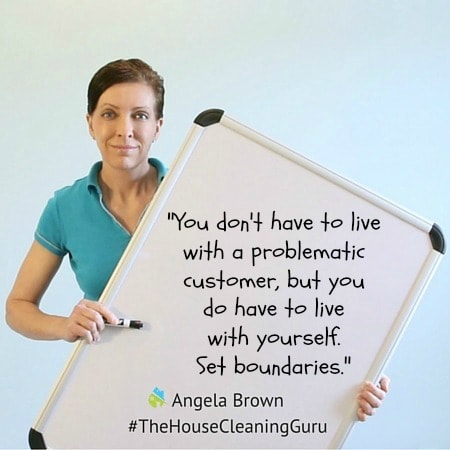 Problematic customers thrive on chaos. They are only happy when they’ve tossed you off kilter. Don’t let it happen. Stand up straight. Roll your shoulders back and exude great posture. Look them straight in the eye. Be attentive. They are playing a game and they want to win. If you let your guard down, you lose. Displaying a lack of confidence and they will walk all over you. If you don’t have boundaries, they will push you around. Keep your hands to your side, don’t fold them, this shows defensive body language. They are looking for weakness, so don’t show it.
Problematic customers thrive on chaos. They are only happy when they’ve tossed you off kilter. Don’t let it happen. Stand up straight. Roll your shoulders back and exude great posture. Look them straight in the eye. Be attentive. They are playing a game and they want to win. If you let your guard down, you lose. Displaying a lack of confidence and they will walk all over you. If you don’t have boundaries, they will push you around. Keep your hands to your side, don’t fold them, this shows defensive body language. They are looking for weakness, so don’t show it.
Don’t Tolerate Abuse
Set boundaries and stick to them. “I want to help you, but I won’t have this discussion while you are shouting and cussing at me. Please be civil or our conversation is over.” If they keep shouting and cussing, walk away. Don’t engage, don’t defend your choice. In this moment, you train your customers how much they can abuse you. Don’t tolerate abuse.
If you walk away don’t look back. Don’t beat yourself up, or feel guilty for ending the conversation. This isn’t your fault, and you gave them fair warning. And it doesn’t mean you are going to lose the client. Often the client will respect you for holding your ground – most people won’t stand up to them. This is a new challenge, and they will be back, but polite.
You don’t have to live with a problematic customer, but you do have to live with yourself. Set boundaries and keep your professionalism and attitude in check.

End the Contract If Necessary
A problematic customer can also be a neurotic psychopath. And while you can help a problematic customer; you CANNOT help a neurotic psychopath.
End the contract if necessary.
I had a house cleaning client who was a problematic customer and a neurotic psychopath. She was manipulative, superior, high maintenance, demanding, witchy, and irritable. She lied about the previous house cleaners to me and on social media. Guilt and complaining were her way of communicating. She didn’t respect my time, or pricing schedule and refused to pay for cleaning.

I do offer a 100% Satisfaction Guarantee based on a worksheet of tasks we agree to up front. But, if at the last minute you toss in extra chores and I don’t have time to clean them, I can’t guarantee those. This is all explained in our initial walkthrough because I’m only human and can only do so much. Enter damage control for house cleaners.
And it’s not me. I have 30 clients on a waiting list at any given time – and I don’t need a problematic customer in the mix. “Hey, you know what? I just checked and we’re not a good fit for each other. No charge for today, since you’re not happy, but this is my last cleaning. Thanks for your business.”

Psycho
You wouldn’t believe that this woman as unhappy as she was, wouldn’t let me go. She begged, guilted and threatened me. Besides that, she insisted on paying me for my cleaning and then gave me a tip. But threatened me if I didn’t come back she would ruin my reputation on social media and NextDoor.
Remember I said walk away and don’t look back. I mean don’t look back. But don’t delete that client from your address book. If three more people from the same phone number call you to come clean – chances are it’s her family members. Noting her on your phone will save you from going out there to bid the job again. Her next-door neighbors and the neighbor across the street called. Hoping I would book them for a cleaning slot they could “give to her”. Psychopathic on so many levels.
This is your business. You get to decide who you want to work with. Yes, customers pay your bills and they can be a blessing in your life. They can also be a curse. You have a choice – choose the customers who are blessings.
Do you have a problematic customer story? Do tell. 😉

Disclosure
During the shows we recommend services, sites, and products to help you improve your cleaning and grow your cleaning business. We have partnerships with these companies to provide you with discounts, and savings. By clicking on and buying from the links in the show notes, we may receive a commission which helps pay for the production costs of the show.
Support the show so we can continue to bring you free tips to improve your cleaning and help you grow your cleaning business. THANK YOU!
About the Show
Learn how the show came to be, interesting facts about the show host, and other frequently asked questions about the show.
Resources For This Episode
Dealing with Difficult Customers – http://amzn.to/2xqx1Lp
Powerful Phrases for Dealing with Difficult People: Over 325 Ready-to-Use Words and Phrases for Working with Challenging Personalities – http://amzn.to/2gI536S
Coping with Difficult People: The Proven-Effective Battle Plan That Has Helped Millions Deal with the Troublemakers in Their Lives at Home and at Work – http://amzn.to/2y8x0zY
Nasty People – http://amzn.to/2zSrIWF
Take the Bully by the Horns: Stop Unethical, Uncooperative, or Unpleasant People from Running and Ruining Your Life – http://amzn.to/2gGoGME
Beating the Workplace Bully: A Tactical Guide to Taking Charge – http://amzn.to/2zaTVLh
Surviving Bullies, Queen Bees & Psychopaths in the Workplace – http://amzn.to/2zaUeWr
Prisoners of A Hostile Work Environment: How to Take Control of Your Job and Protect Yourself from A Bully Boss – http://amzn.to/2zbNmYW
It’s Always Personal: Navigating Emotion in the New Workplace – http://amzn.to/2z90WMs
Stand Up for Yourself Without Getting Fired – http://amzn.to/2y78C1X
Permissions To Share
You Have Our Permission To Share This Episode
Show Sponsors
Savvy Cleaner – House Cleaner Training & Certification – https://SavvyCleaner.com
HouseCleaning360 – Referral Database Home Service Providers – https://HouseCleaning360.com

